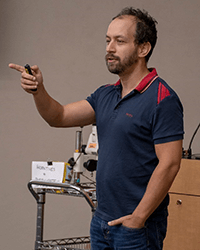Dr. Xavier Martini
Associate Professor
Entomology
My appointment is 70% Research and 30% Extension. Through the study of the ecology and behavior of the insect vectors of major plant pathogens in Florida, the focus of my program is to develop effective and bio-rational integrated pest management strategies to control the diseases they carry. Eventually, my research will lead to improvements in grower profitability, reduced environmental risks and improved sustainability of crop production.
PROGRAMS
Research Focus:
Insect Pest Vectors
Chemical Ecology
Insect Behavior
Integrated Pest Management
Extension Focus:
Horticulture insect pests
Citrus insect pests
-
Research
Dr Martini’s research focuses on different insect pest vectors of plant pathogens. The common ground of my program involves applied chemical ecology (i.e. plant-insect communication), and development of environmentally sound methods to control these pests. My research focuses on four main projects.

- Asian citrus psyllid. Since my arrival to the University of Florida, I have been interested in the ecology and behavior of the Asian citrus psyllid, the vector of the pathogen that causes citrus greening. Citrus greening has destroyed the citrus industry in south and central Florida, infecting 80% of the citrus cultivated. Until recently, D. citri was not found north of Gainesville; However, We have recently discovered that the Asian citrus psyllid is established in North Florida, mostly in urban habitats and is able to survive winter temperatures below 32° F (article in preparation). This is concerning as my research demonstrated that D. citri can disperse several kilometers during both spring and summer, using wind currents as a carrier. However, we have observed that windbreaks contribute to reduce psyllid migrations within citrus groves and protect citrus grove against citrus leafminers. Manipulating habitat by planting windbreaks offers an important non-chemical management tool.
- The Redbay ambrosia beetle (RAB) is the vector of the fungus responsible for laurel wilt disease that has been destructive to trees in the family Lauraceae in Southeastern forests of United States. We studied the chemical ecology of the beetles and demonstrated that glabratus is repelled by volatiles associated to salicylic acid pathway systemic response. The identified repellents have been used in field situations to decrease infestations of X. glabratus against redbay and avocado. Recently, these repellents have been integrated in two push-pull systems that are particularly efficient in reducing the number of ambrosia beetles attacking redbay and avocado, respectively (one article submitted, one in preparation).
- Vegetable entomology. North Florida vegetable production is hampered by a complex of generalist insects. Among them, thrips and whiteflies cause the highest losses by transmitting multiple plant viruses. Therefore, I have initiated a program to study the ecology and behavior of thrips and whitefly and their associated natural enemies. Among them, the minute pirate bug (MPB) have shown very high capabilities in controlling thrips populations. We first developed a new rearing method for MPB (article in preparation). We now are studying how MPB uses thrips cues (such as thrips odors, and thrips ‘footprints’) to locate preys. We found that MPB are using thrips walking trails to find their prey (article in preparation). We developed a new trap method to sample thrips and whiteflies in vegetables. We established the phenology and the distribution of thrips affecting onion in north Florida. Regarding whiteflies, we are examining their host preference and how chemical cues interact with visual cues. We demonstrated that whiteflies are attracted to geminivrius-infected plants due to the yellowing of the host leaves and changes in volatile emissions. Based on this knowledge, we are developing a push-pull system to control whiteflies in cucurbits using kaolin, visual attractants and repellents.
- Rose rosette disease. The Rose Rosette Virus (RRV) is transmitted by the eriophyid mite, Phyllocoptes fructiphilus. Florida is an important producer of roses, and arrival of the disease in our state could be detrimental for the horticultural industry. A new PhD student, funded with a USDA-NIFA grant, has initiated a program on the chemical ecology of the disease and biological control of the mite. Notably, he is studying changes in headspace volatiles released after viral infection, and he is investigating the use of salicylic acid pathway stimulant and predatory mites to control the eriophyid mites. We are currently conducting a survey of the predatory mites present in ornamental rose that have potential as biological control agents against P. fructiphilus
-
Extension
Dr Martini's Extension program uses the findings from my research program to educate growers on insect pest management for different commodities grow in north Florida. The goal of my program is to ensure positive impact on pest management efficiency, technology adoption, and enhancement of grower knowledge. I also look for feedback from growers, to identify what research area will be meaningful for them to investigate. Considering the diversity of crops grown in north Florida, my goal is to work in collaboration with growers from different commodities. I am part of a number of different focus teams within the NFREC: the rose production team, the tomato production team, and the citrus team. In addition, I am also the scientific advisor for the Cold Hardy Citrus Association. This involvement helps me to identify and address key pest management issues facing growers in north Florida. I work closely with Extension faculty from Franklin, Bay, Jefferson, Gulf and Suwannee Counties in developing my Extension program. Information on my programs is disseminated to county faculty, growers and citizen using online publications, talks at Extension meetings, posters and when needed, one-on-one interactions. Since I started my new position at the NFREC in September 2016, I developed my Extension appointment in two main areas: citrus entomology and vegetable entomology.
To review publications please use the Extension link provided under the Publications dropdown located on the right side of my page.

Contact
Dr. Martini, Xavier
Assistant Professor
Entomology
155 Research Rd.
Quincy, FL 32351
Phone: 850-875-7160
Fax: 352-846-6617
Email
Horticulture Entomology Lab Group
You can follow me and my lab on social medias:
Twitter: @XavierMartini
Instagram: xavier_martini_florida
-
Education
- Ph.D. Ecology, University of Toulouse, France 2010
- M.S. Entomology, University of Tours, France 2005
- B.S. Populations and Ecosystems Biology, University of Toulouse, France 2002
- Publications
-
Professional Service and Awards
- Associate Editor for the journal Frontiers in Ecology and Evolution.
- 2016: Royal Entomological Society Award for the best paper published in Agricultural and Forest Entomology
- 2015: Inaugural recipient of the Postdoc of the Month Award awarded by the Journal of Postdoctoral Research
